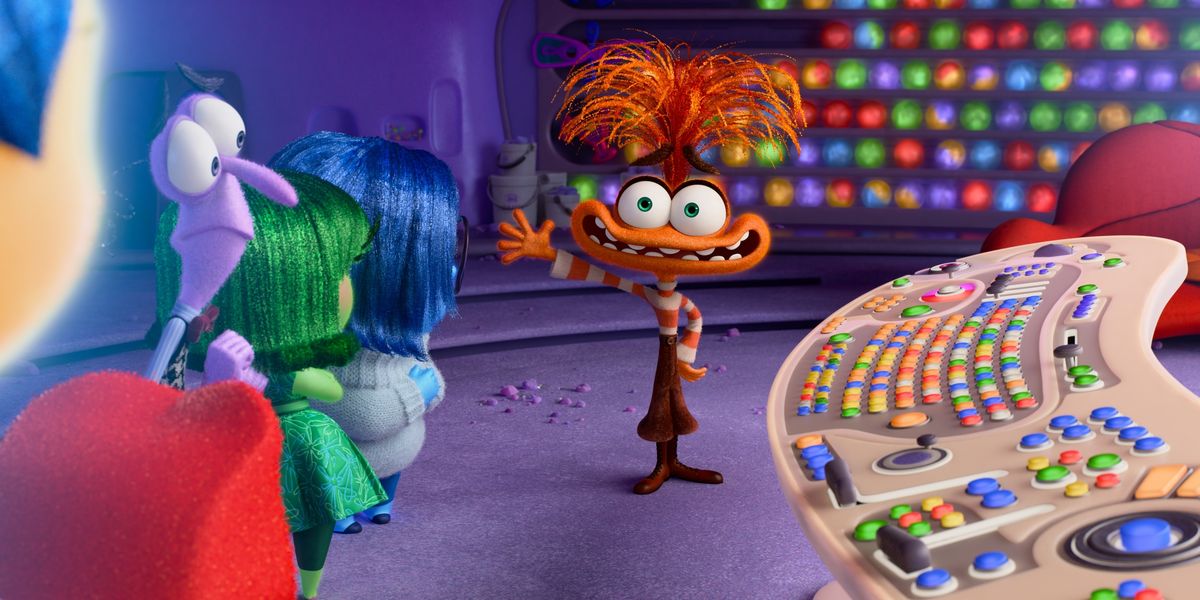
INSIDE OUT 2 AND THE POWER OF EMBRACING YOUR EMOTIONS AS A WOMAN
Have you ever felt completely ruled by your emotions? Wishing you could calm the hell down, but unable to just get a handle on things? As though your mood is determined by puppeteers pulling little strings above your head, one minute directing you to be the happiest you’ve ever felt; the next leading you down a path of doom, gloom and general… blergh?
Yup, get in line.
But despite this being perfectly normal for, well, literally all of us, the idea that women in particular are unable to control their emotions is a sexist trope as old as time. And while some people might feel emotions more strongly than others, such as empaths or highly sensitive people, it is absolutely not unique to women. Of course, our old friend the patriarchy likes to tell us that we should bottle up any difficult feelings instead of confronting them head on or processing them in a healthy way. Sound familiar?
It's the introduction of our trickier emotions that forms the central storyline to Inside Out 2, the long-awaited sequel to Disney’s hit Inside Out which saw us enter the brain of 11-year-old Riley, a young girl dealing with her conflicting emotions as she grows up. As we return to Riley years later, now a full-blown teenager, the feels are about to get real.
Inside Out 2 sees the existing characters Joy (Amy Poehler), Sadness (Phyllis Smith), Anger (Lewis Black), Fear (Tony Hale) and Disgust (Liza Lapira) joined by interlopers Embarrassment (Paul Walter Hauser), Ennui - “it’s what you would call zee boredom” -(Adèle Exarchopoulos) and Envy (Ayo Edebiri). But none play as big a part as “I plan for the future” Anxiety (Maya Hawke).
As Riley attempts to navigate life at a new school away from her old friends and the labyrinth of teenage emotions, she finds herself going through changes that are anything but easy to handle. The film adeptly handles the nuance of childhood psychology in a coming-of-age story that we can absolutely all relate to (self-doubt, shame, mortification? Oh they all live in our heads, rent free).
So if you’ve ever found yourself wailing “I’m the worst!” first thing in the morning like Riley does, you’re not alone. In fact, explains clinical psychologist Rabeea Saleem, this may relate because society teaches girls to suppress certain emotions and to feign others, in order to fit into socially constructed gender standards.
“From a very young age, children are encouraged either explicitly or implicitly via modelling or reinforcement to behave in ways that conform to their gender norms.”
Women, Saleem says, are “generally more expressive emotionally than men, specifically when it comes to positive emotion,” because these are traits that are often encouraged in women. However, she says, “when it comes to expressing negative emotions, women internalise it more than men.”
She continues: “this is consistent with women and girls’ gender- based social conditioning and societal norms. Men are allowed and even encouraged to express certain negative emotions like anger while women are expected to suppress ‘unladylike’ emotional expressions such as anger or annoyance.”
The result of this, she explains, is that women and girls feel the need to mask or conceal the emotions they feel (yup, been there). We see this in Inside Out 2 when the incumbent crew of emotions are locked in a jam jar by the incoming group, screaming “we are suppressed emotions!” and proceed to go on a journey to make their way back to Riley to regain equilibrium.
The problem with suppressing our emotions – in a Kilner jar or otherwise – as a regulation strategy explains Saleem, is that this can lead to dysfunctional emotion regulation. “This stress does nothing to alleviate the negative affective state but instead, the negative emotions remain accumulated and unresolved.” We see this with how Riley’s story develops – no spoilers!
So then, how can we avoid suppressing our emotions without becoming an outward ball of insecurities?
Simply, Saleem says, “emotions should be felt even if they are negative or distressing,” and “the first step towards this is to acknowledge them.” This can be by just making a mental note to yourself of how you’re feeling, journalling or speaking to a friend or family member.
She goes on to note that not all female emotions are discouraged by society. While we often invalidate people for feeling bad or low, “we also expect women and girls express or pretend to express only positive emotions”. To break out of this cycle, we should “normalise and encourage children to express negative emotions so they don’t perceive them as something they should conceal or dismiss.” As we know all too well, everyone contains multitudes.
And if tapping into our emotions doesn’t come naturally to us? Saleem suggests channelling negative emotions like anxiety, anger or (the very chic-seeming) ennui into positive activities like sports, exercise, journaling or playing a musical instrument. So, really, all the feels are setting us up to headline Glastonbury or win the Olympics, right? We like to think so.
Inside Out 2 is in cinemas nationwide from 14 June
2024-06-07T11:18:24Z dg43tfdfdgfd